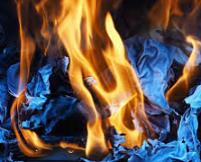Before entering fully into the definition of the term combustion, it is necessary to know what its etymological origin is. In this case, we can state that it is a word that derives from Latin, specifically from "combustio - combustionis", which can be translated as "action and effect of burning completely." We can highlight that this Latin word in turn derives from the verb "comburere", which is the result of the sum of two very different parts:
-The prefix «con-«, which can be translated as «entirely».
-The verb "urere", which means "to burn."
The concept refers to the act and result of burning or burning : subjecting to the action of fire .
 For example: "The combustion destroyed the cabin in a matter of minutes" , "The firefighters explained that the combustion was started by high temperatures and the action of the sun on the bales" , "A failure in the cooling system caused the combustion that burned the rocket .
For example: "The combustion destroyed the cabin in a matter of minutes" , "The firefighters explained that the combustion was started by high temperatures and the action of the sun on the bales" , "A failure in the cooling system caused the combustion that burned the rocket .
If we focus on chemistry , the reaction that occurs between an oxidizable material and oxygen is called combustion, which is revealed through flames and generates the release of energy . In other words: combustion involves the oxidation of an element through a process that is made visible by fire and that includes the release of energy in the form of light and heat.
For the development of this chemical reaction , a substance capable of burning (called fuel ) and a substance that generates combustion (the oxidizer ) are needed. Generally the oxidizer is oxygen. The reaction causes fuel components to oxidize .
A fuel, to begin combustion, must reach the ignition temperature . This temperature means that its vapors burn spontaneously. Once the fuel reaches its ignition temperature, combustion begins.
It is important to keep in mind that the chemical energy released during combustion can be used as mechanical energy . That is the key to the operation of automobiles, to cite one case, whose engines use the combustion of gasoline (naphtha) or other fuel to obtain the energy that enables the movement of the vehicle.
In addition to everything indicated, we cannot ignore that there are various types of combustion, among which we can highlight the following:
-Complete combustion, which is what takes place when the entire reaction occurs. It also responds to the name of perfect combustion and what takes place in it is that the different components are completely oxidized, which results in the formation of liquid water and carbon dioxide and even sulfur dioxide.
-Incomplete combustion, which is what occurs when there are compounds that do not burn completely. These are compounds that can be especially toxic. These range from hydrogen to carbon monoxide.
-Stoichiometric combustion, which is what takes place when the exact amount of air is used. It has the peculiarity that it turns out to be so perfect that it can only be achieved in a laboratory.
